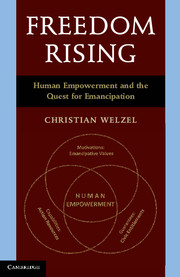Book contents
- Frontmatter
- Dedication
- Contents
- List of Tables
- List of Figures
- List of Boxes
- Abbreviations
- Preface
- Acknowledgment
- Introduction
- Part A Understanding Emancipative Values
- Part B Emancipative Values as a Civic Force
- Part C Democratic Impulses of Emancipative Values
- Part D Emancipative Values in Human Civilization
- Conclusion
- References
- Index
Preface
Published online by Cambridge University Press: 05 June 2014
- Frontmatter
- Dedication
- Contents
- List of Tables
- List of Figures
- List of Boxes
- Abbreviations
- Preface
- Acknowledgment
- Introduction
- Part A Understanding Emancipative Values
- Part B Emancipative Values as a Civic Force
- Part C Democratic Impulses of Emancipative Values
- Part D Emancipative Values in Human Civilization
- Conclusion
- References
- Index
Summary
Preface
This book is indebted to the lifetime work of Ronald Inglehart. Over the past fifteen years, I had the privilege of becoming one of Ron’s closest collaborators and friends. Apart from our work on dozens of publications, Ron is a continuous source of inspiration in our frequent conversations about social change, human values, and the role of evolution in the civilization process. I know his work on postmaterialism since my days in college and followed the debate about this concept with fascination. Despite the criticism, I remain convinced that the basic logic holds: fading existential pressures open people’s minds, making them prioritize freedom over security, autonomy over authority, diversity over uniformity, and creativity over discipline. By the same token, persistent existential pressures keep people’s minds closed, in which case they emphasize the opposite priorities. I am equally convinced that the further implications of this logic hold as well: the existentially relieved state of mind is the source of tolerance and solidarity beyond one’s in-group; the existentially stressed state of mind is the source of discrimination and hostility against out-groups.
These propositions assume a universal logic of how the human mind copes with existential conditions. This book describes this logic as the utility ladder of freedoms. The more existential pressures recede, the more does the nature of life shift from a source of threats into a source of opportunities. As this happens, societies ascend the utility ladder of freedoms: practicing and tolerating freedoms becomes increasingly useful to take advantage of what a more promising life offers. Since evolution favors utility-realizing capacities, it has “programmed” humans to seek freedoms – in as much as these are useful to thrive under given circumstances. Culture does not have the power to turn off this logic. Instead, the taboos that culture imposes and the choices that it tolerates are themselves selected by the utility of freedoms: when fading existential pressures make freedoms more useful, cultures shift from denying freedoms to guaranteeing them. This happens because people change their mind in this direction – recognizing that improving living conditions move them up the utility ladder of freedoms. These individual adaptations reinforce each other through mutual recognition. Reciprocally reinforced adaptations generate mass trends that follow their own evolutionary logic; they are not the result of propaganda, indoctrination, and other elite-fabricated manipulations.
- Type
- Chapter
- Information
- Freedom RisingHuman Empowerment and the Quest for Emancipation, pp. xxiii - xxviPublisher: Cambridge University PressPrint publication year: 2013



